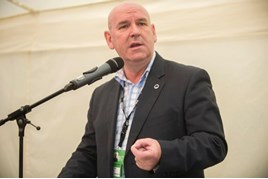“That then drove the companies to go on a massive recruitment drive. We got heavily involved in recruitment and retention. When people talk about our salaries - no one gave us anything.
“I love this idea that ‘your salaries have doubled’. Well, yes, but productivity has more than doubled. The shape of the new railways needed different things. We sold things to
get it.
“On certain issues we did quite well, but on other issues we’re fighting a rearguard battle to get some of those things back.”
Twenty years on, many train companies remain vastly reliant on voluntary overtime.
“Our policies want all work included within the roster, agreed and contracted for. We don’t want this little gap when there’s a shortfall all the time, which leads to the occasional industrial or other issue.”
Rest day working should not be encouraged either: “What we never want to go back to is the period of time when people had to work to live and work every single day. People were allowed to work 28 days on the trot or more. It was only after the Clapham Junction disaster that people had to have one day in 14 off.
“What we sought to do was ensure people were remunerated enough that they didn’t have to work all the time. So we have a policy that we ensure companies are training. Our members only work rest days when companies are recruiting, to facilitate flexibility for recruitment and training to take place, or if there is major infrastructure works. Because you wouldn’t recruit people to lay people off, or if there is a major railway issue when it’s all hands to the pump.
Such policies have helped ASLEF grow its membership base. But in a perfect world, surely there’d be no need for trade unions?
“The Confederation of British Industry recognises that organisations that have trade unions are far more productive than those that don’t. Having structures in place that allow you to deal on behalf of people on pay, and deal with grievances in an effective manner, and deliver what changes you need organisationally. And 95% of the time we are operating in concert with people.
“We don’t get identified for the good work that we do. People don’t often look at the reasons that things happen. When was the last time we went on strike?”
“Errr, last year?” I query.
“I think that was the RMT. Why would you be fearful of people? Political parties are like trade unions. Just a different sort.”
- This feature was published in RAIL 774 on May 13 2015














Login to comment
Comments
Richard Dickinson - 26/08/2023 09:22
I was at Stonebridge Park from 68 to 77 and previously at old oak common from 61 until 68 what is micks footplate experience and depos he worked at.